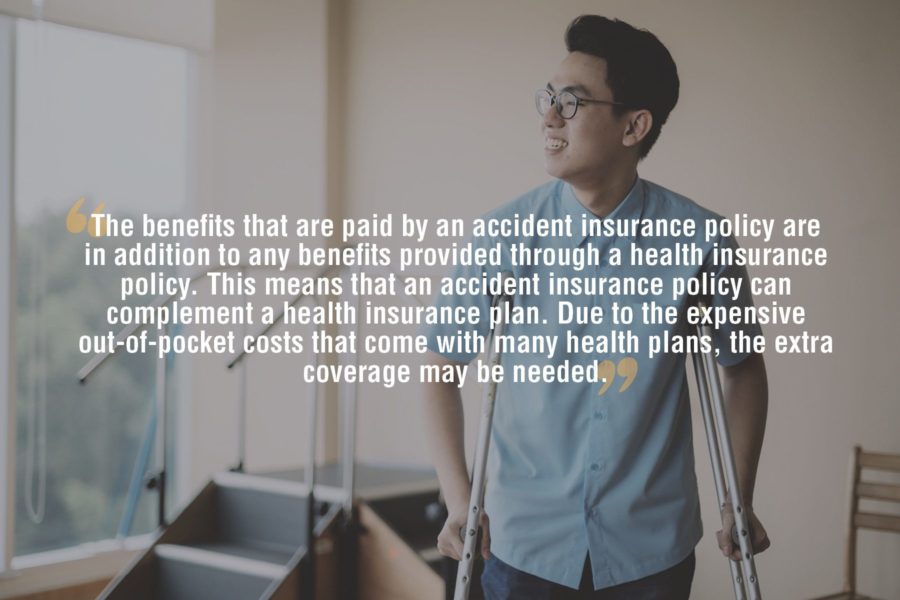Accident insurance is a great product to add to any employee benefits package. Here’s a look at how accident insurance works, what an accident policy covers and why employees need it.
How does accident insurance work?
Accident insurance provides coverage for medical expenses that are the result of covered accidents. The details will vary depending on the terms of the policy and the insurance company. However, most accident insurance plans from insurance companies will cover emergency room visits, ambulance, hospital confinement and certain scheduled medical benefits for accidental injuries. Covered accidental injuries typically include things like broken bones, dislocations, concussions, eye injuries and burns.
If you are injured in an accident, the plan will typically provide a lump sum cash payment. The amount of the payment will depend on the policy limits, as well as the nature of the injury and treatment. Compared to a minor injury, a more serious injury that requires more extensive treatment will generally result in a larger payout.
The payment can be used to cover some of the out-of-pocket medical costs that occur during treatment. However, the benefits are typically paid directly to the policyholder. This means that the policyholder may be able to use some benefits for non-medical costs associated with the injury, such as lost wages or childcare.
Why do you need accident insurance?
Injuries lead to approximately 35 million emergency room visits a year, according to the CDC.
The National Safety Council says that there were 48.3 million injuries in the U.S. in 2019, and more than eight million people went to the emergency room for fall-related injuries.
People can be injured while playing sports, but you don’t have to be an athlete or bicyclist to be injured accidentally. For example, you can also be injured if you trip and fall while walking or slip in the shower.
The truth is that anyone can be impacted by an unexpected injury. Accident insurance helps ease the financial burden by providing a payout. That way, you can focus on recovering instead of worrying about how you’ll pay your medical bills.
What is not covered under an accident insurance policy?
Accident insurance provides useful coverage, but it does not do everything. It is sometimes called supplemental accident insurance, and it is meant to supplement other insurance policies.
- Accident insurance does not typically provide coverage for illnesses like heart disease, cancer or stroke. It provides coverage for accidental injuries.
- Accident insurance does not provide ongoing monthly benefits. It typically provides one lump sum cash payment per accident event.
- Accident insurance does not provide payment to hospitals or providers. The accident insurance company will provide a payment directly to the policyholder, who is then responsible for paying medical bills.
- Accident insurance may not cover certain injuries that are the result of reckless activity, criminal action or intentional self-injury. See your policy for exclusions.
Do you need accident insurance when you have health insurance?
The benefits that are paid by an accident insurance policy are in addition to any benefits provided through a health insurance policy. This means that an accident insurance policy can complement a health insurance plan. Due to the expensive out-of-pocket costs that come with many health plans, the extra coverage may be needed.
The rise of high-deductible health insurance plans makes extra coverage even more important. According to the Bureau of Labor Statistics, only 15 percent of workers were enrolled in high deductible health plans in 2010. By 2018, 45 percent of workers were enrolled in high deductible health plans.
This means that about half of all workers are enrolled in plans with high deductibles. If they’re healthy, they may be fine with the high deductible, especially if it means that the premium is relatively low. But what happens if their good health turns unexpectedly? An accident can strike anyone, no matter how healthy they are, and when it strikes someone with a high deductible, a financial disaster might follow the medical disaster.
In 2021, a plan that provides self-only coverage must have an annual deductible that is not less than $1,400 in order to meet the IRS’s definition of a high-deductible health plan. For a plan that provides family coverage, the deductible must not be less than $2,800. The annual out-of-pocket maximum is $7,000 for self-only coverage and $14,000 for family coverage.
When out-of-network charges result in surprise bills, the costs can be even higher.
A Federal Reserve study found that 40 percent of Americans don’t have enough in cash, savings or credit card to cover an unexpected bill of $400. If they can’t cover a $400 bill, they definitely can’t cover a $2,800 deductible or a $14,000 out-of-pocket maximum. And this study was from before the pandemic – many people’s financial situation has only gotten worse.
Accident insurance can help. If an eligible accident occurs, the insurance company typically pays a lump sum cash benefit to the policyholder. This money can cover out-of-pocket costs that health insurance leaves. You don’t even have to worry about insurance networks.
How does accident insurance differ from critical illness or disability insurance?
Accident insurance differs from other supplemental insurance policies like critical illness and disability insurance in important ways.
First of all, accident insurance is designed to provide coverage for accidental injuries, not for cancer, heart disease or other illnesses. Critical illness insurance, as the name suggests, provides coverage for certain illnesses.
Disability insurance can provide coverage for illnesses or injuries, but it works differently. Sometimes called paycheck protection, disability insurance provides a monthly benefit that can replace lost wages when an illness or injury renders someone unable to work. This is different from the lump sum cash payment that accident insurance provides.
Offering Accident Insurance as a Voluntary Benefit
While health insurance is known for having high premium costs, accident insurance can be very affordable. Employers can offer accident insurance to employees as a voluntary benefit. The employer does not need to take on any of the premium costs, and the employee gets guaranteed coverage and convenient payroll deductions. Given the high cost of medical bills, the rise of high deductible health plans, and the average person’s lack of savings, this is a great supplemental insurance plan to consider.





